Institutional Context
Summary
The University of Brighton is proud of our research and knowledge exchange activity which enriches our teaching, cultivates important partnerships, and is recognised for producing significant positive societal and economic impact.
Our strategy positions us to create, apply and put knowledge to work and our four core values of partnership, sustainability, creativity and inclusivity drive our knowledge exchange.
Fresh thinking, interdisciplinary research and collaborative partnerships with industry, institutions and communities enable us to bring expertise from different fields to address society’s most pressing issues.
Together, we address global challenges to tackle climate change, enhance equality and inclusivity, increase positive health and wellbeing outcomes, and enable creative and sustainable economies. We work to improve lives in our region and beyond.
Institutional context
The University of Brighton is a teaching-intensive, research-active institution, with 18,000 students and 2,400 staff. Disciplines across seven academic schools range from pharmacy to engineering, psychology to illustration, business to education, along with a joint Medical School with the University of Sussex. Our main campus is in the Greater Brighton City Region with significant links to East and West Sussex County Councils, and Brighton and Hove Unitary Authority.
With a rich history in knowledge exchange (KE), our Research and Knowledge Exchange Strategic Plan 2022-2025 further embeds KE across the institution and focuses on cultivating research and knowledge exchange excellence, nurturing talent, sustaining impact and promoting internationalisation. The Research and Knowledge Exchange Department provides expert support and guidance on KE and public and community engagement. Six additional professional services teams work with external partners to deliver innovative KE opportunities. Associate Deans for Research and Knowledge Exchange provide academic leadership in our schools and KE is reflected in our teaching and real-world experiences for students. Over academics are involved in KE activity supporting a wide range of partnerships.
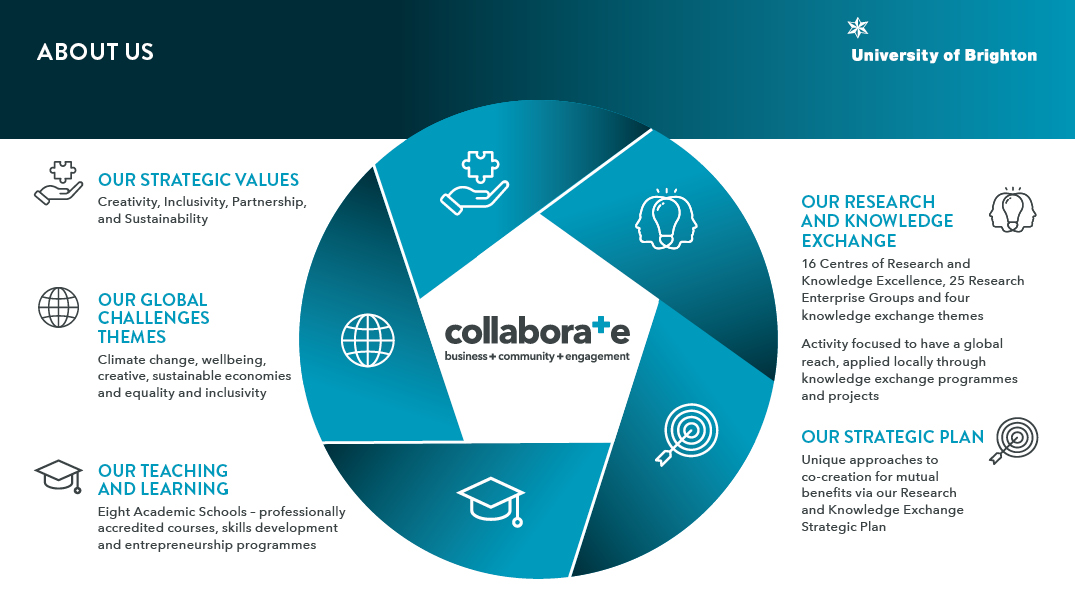
Our core values underpin our distinctive knowledge exchange and we harness a breadth and depth of activities that recognise the importance of mutual benefits for students, community partners, businesses, and institutions.
Our distinctiveness is recognised by our partners for:
Being innovative, creative and accessible to support the needs of our communities
For example, our research expertise into complex evaluation methodologies is valued, including working with communities to co-design evaluation programmes.
Thinking globally and acting locally
One example of this approach is our work in collaboration with the Aquifer Partnership and the Living Coast Biosphere where colleagues are sharing learning with local schools from a UNESCO-backed programme to reduce groundwater pollution.
Collaborating through networks
Our drive to support the regional SME innovation ecosystem has led to the delivery of university regional networks and forums supporting SMEs to become innovation active. The university has leveraged grant funding to invest in the economic wellbeing of our communities, offering free SME access to innovation skills enhancement and seed-funding through programmes such as CGUK and RISE.
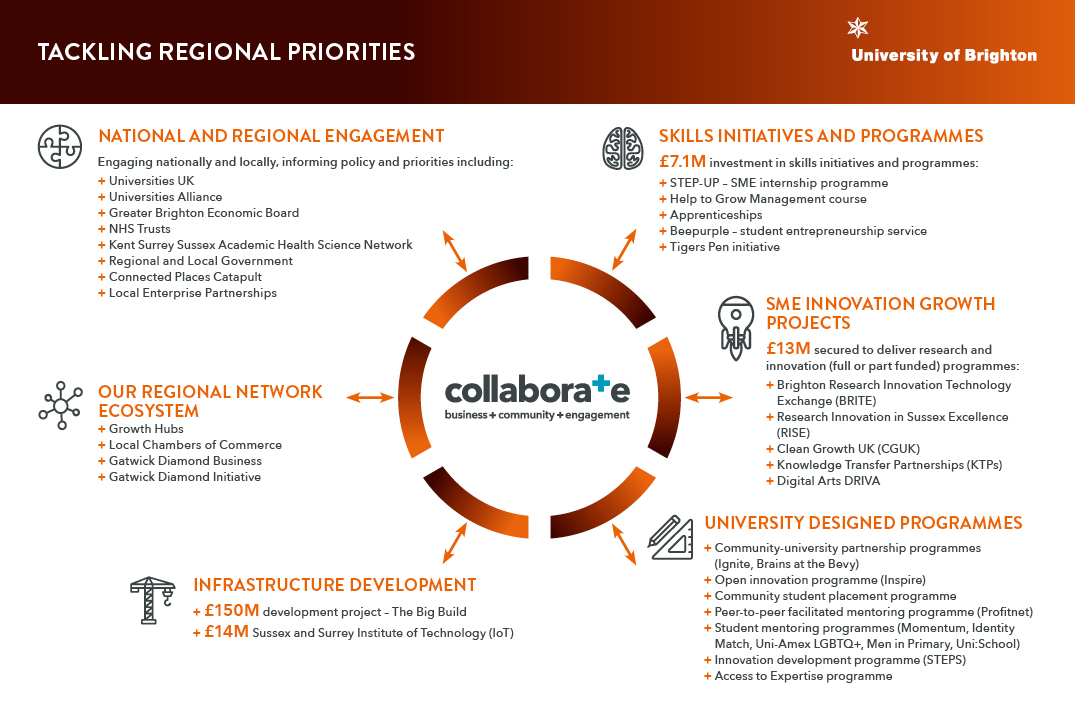
Unlocking expertise, supporting our regional strengths
From 2024-25, the University will be located across three campuses in Brighton reflecting our strengths and the needs of the region including high-value, knowledge-intensive sectors such as engineering/manufacturing, creative/digital, financial services and health/life sciences. Through a £150m expansion of our Moulsecoomb campus, part of the Brighton and Hove city integrated regeneration plan, we have demonstrated our commitment to improving access to facilities and expertise for regional partners.
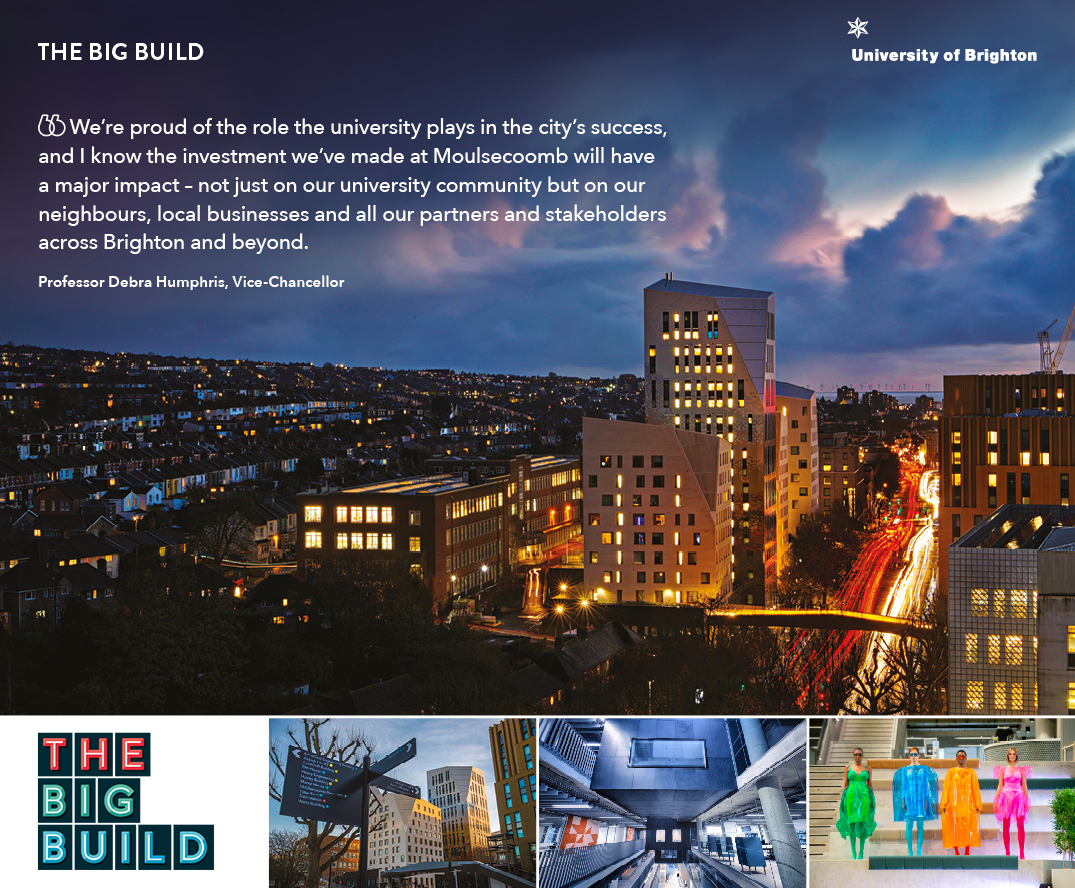
Developing sustainable partnerships
We have strong, strategic bi-lateral partnerships with organisations across a range of sectors including businesses such as JLC, , Coopervision and Southern Water, and public sector bodies such as the Greater Brighton Economic Board and the NHS.
Public and community engagement together with local growth and regeneration are central to our contribution to society and the economy. We will continue to develop, deepen and evolve our close collaborations to make a tangible difference to our region.
For further information, please send queries to knowledgeexchange@brighton.ac.uk
Local Growth and Regeneration
Summary of approach
The University of Brighton (UoB) harnesses our learning and teaching, research excellence and facilities to deliver sustained, effective outcomes that address the specific needs of our region. We provide an innovation gateway for students, community partners, businesses, and policymakers to address global challenges, regionally.
Our four core strategic values (partnership, sustainability, creativity and inclusivity) underpin collaborations that address health and educational inequalities (Brighton Living Lab), secure creative, sustainable economies (BRITE) and tackle climate change (MIchelmesh Bricks). We work to increase regional economic prosperity, discover and enable innovative solutions and support business growth. We invest in substantial regeneration capital programmes across our campuses reflecting regional priorities and business needs.
Aspect 1: Strategy
UoB is an anchor institution that is teaching-intensive, research-active, with a focus on delivering creative business solutions, talent development and tackling regional priorities. We help shape the agendas of regional government bodies such as the Greater Brighton Economic Board, NHS partners, and local authorities, and of charities such as regional rivers trusts, through advisory roles, testing research in real-life contexts and providing forums and networks to identify and establish needs that address societal challenges.
Our strategy, Practical Wisdom: Brighton 2025, demonstrates how these priorities support our mission to realise potential and shape futures through high-quality, practice-based learning, teaching, research and knowledge exchange. Local growth and regeneration are embedded across the strategic framework and prioritised through the development of the emerging institutional Regional Development Strategic Plan (RDSP).
UoB is situated within an area dominated by 90% micro and SME businesses, in a mixed economic region with no single large metropolitan area. Key geographical areas of economic activity are the Sussex coastal conurbation, with the city of Brighton & Hove at its heart. Our location acts as an innovation gateway that connects us to the economically critical area of Crawley/Gatwick, on to Croydon, London and beyond. We also have a mixed rural economy with a growing visitor experience/economy sector.
Our campuses are aligned to our region’s strengths in high-value, knowledge-intensive sectors including engineering/manufacturing, creative/digital, business and financial services, and health and life sciences. There are campuses and hubs in Brighton, Eastbourne and in Crawley, through the Sussex and Surrey Institute of Technology.
UoB actively engages and collaborates with a wide network of regional stakeholders including local authorities, the NHS and other public sector organisations, economic boards, businesses and business networks. We play a key role in shaping business support for sustainability and the green transition via our leadership of Clean Growth UK. We also have a strong reputation for work with community and voluntary groups through our award-winning Community-University Partnership Programme (CUPP), benefiting local growth, regeneration and community wellbeing.
Through our active stakeholder engagement, our regional priorities were defined as:
Innovating talent: Emphasising skills, talent and curriculum development with a regional focus on employability and entrepreneurial skills.
Addressing global challenges, innovating regional solutions: Utilising our research expertise centred on enhancing health and wellbeing, promoting creative, sustainable economies, society, policy and education and tackling climate change, coupled with our strategic values of equality and inclusion, to develop innovative solutions and sustainable, effective outcomes.
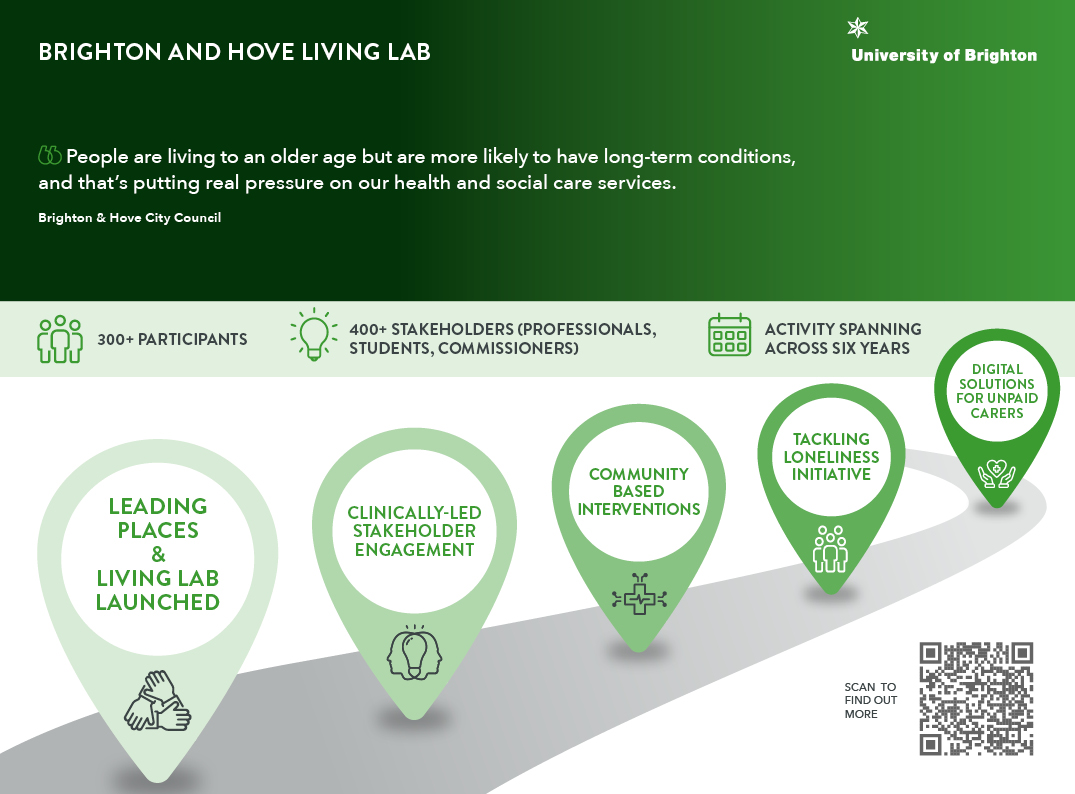
Delivering innovative campus developments and hub facilities: Completing the (£150m) as part of a major Brighton & Hove City Council regeneration project in Moulsecoomb and realigning and investing in our three Brighton campuses to reflect the growing needs of our region (specifically, talent development and addressing global challenges) and to support student experience.
Stimulating SME innovation growth: Developing place-based solutions and networks that support UKRI strategic priorities, regional economic plans such as West Sussex County Council Economic Growth Plan 2018-2023 and objectives of the Greater Brighton Economic Board.
Aspect 2: Activity
Regional priorities drive our approach to local growth and regeneration. As an anchor institution, we work closely with local authorities, East and West Sussex County Council and Brighton and Hove Unitary Authority as well as statutory agencies, community groups and businesses to identify stakeholders’ needs and build successful collaborations to address regional growth, health and education inequalities and secure creative, sustainable economies.
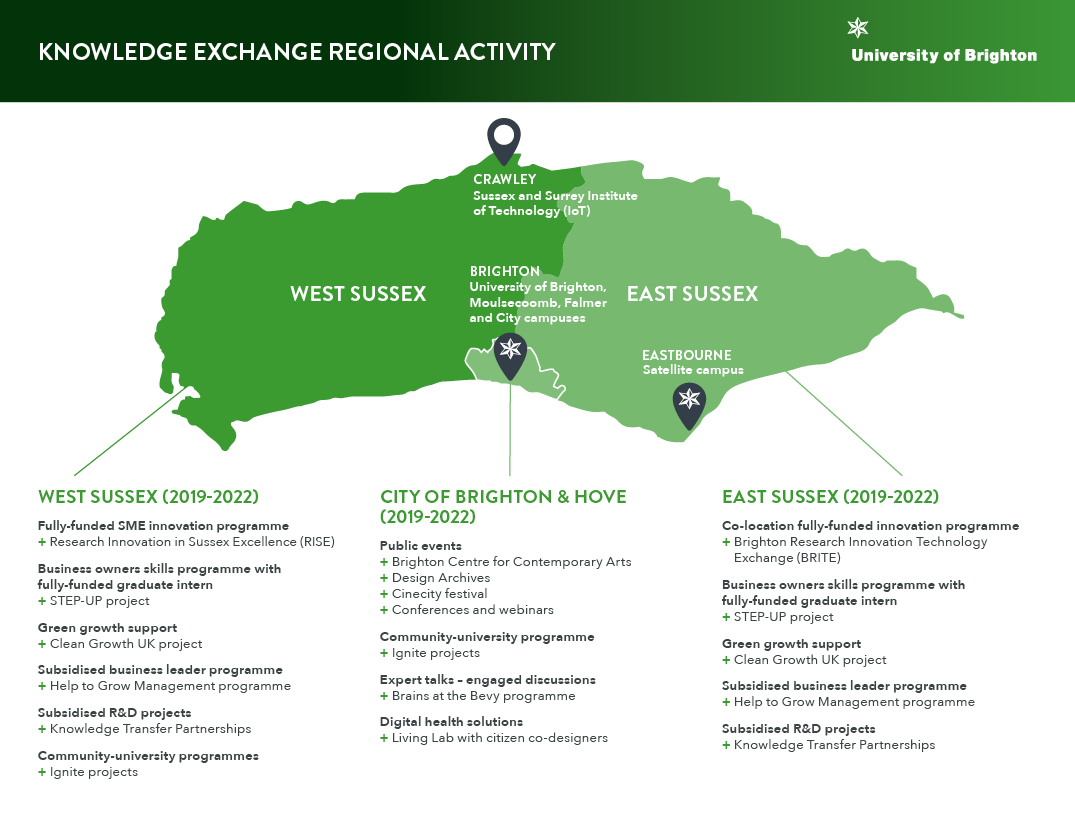
Developing the innovation region
Innovating talent
Collaborating with employers and business representatives is a crucial element in supporting local growth priorities. The majority of our courses are professionally accredited, aligning our work directly with occupational practice. Our regional partners value our linkages to professional bodies such as the ACCA, Health and Care Professions Council, British Computer Society, Institutions of Civil, Electrical, Mechanical and Structural Engineers, RIBA, Chartered Management Institute and the Nursing and Midwifery Council. They also appreciate the entrepreneurial and innovating mindset that lies at the heart of our skills development.
UoB is one of the first universities to offer degree apprenticeships and we partner with over 50 professional organisations to deliver these programmes. We work with local employers to support demand, provide progression routes and training for employees and meet regional skills shortages. Our learners are often from non-traditional educational backgrounds and provide a route for employers seeking to invest in and develop their staff. As part of our commitment to nurturing talent, we are also a strategic partner in the Crawley-based Institute of Technology which seeks to support career progression, upskilling employees and career changers.
Student knowledge exchange is embedded into our curriculum, and we provide students with opportunities to participate in real-world learning experiences. Over the last three years, we have provided over 200 live briefs for students to engage in practical, often multi-disciplinary, projects pulling together findings and opportunities for local businesses. Our postgraduate research students are able to participate in innovation projects supporting SMEs under an experienced researcher.
Our industrial advisory boards within academic schools include members who have collaborated with the University and seek to influence and shape our curriculum and to be the voice of business innovating talent.
Non-accredited learning supports our employer workforce development offer. Over the last three years, we have run programmes including mentoring for regional teachers and teaching leaders, and fully-funded employer engagement programmes to support SME workforce development. We have an excellent relationship with the NHS, supporting nursing and allied health professionals to update knowledge, skills and practice. Our creative industries forums support freelancers and creatives to develop their professional practice, build collaborative communities and grow their skills and business.
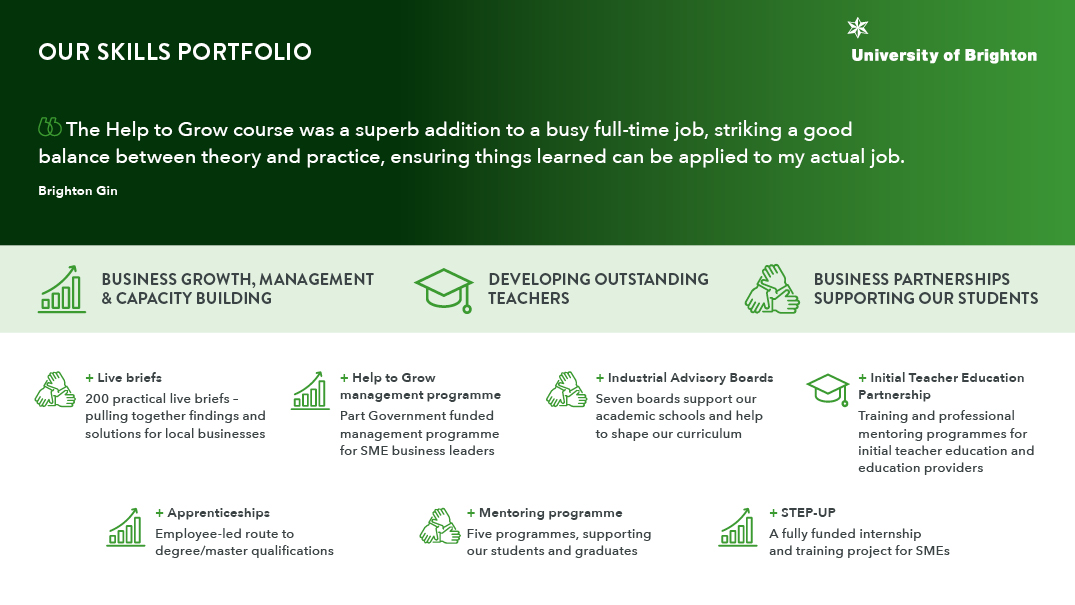
Activities include delivering almost 81,000 days of continuing professional development each year, primarily to health, education and emergency services partners. Our longstanding and award-winning Beepurple programme provides a stimulating culture for student entrepreneurship, delivering to over 1804 students and distributing £61,500 start-up funding.
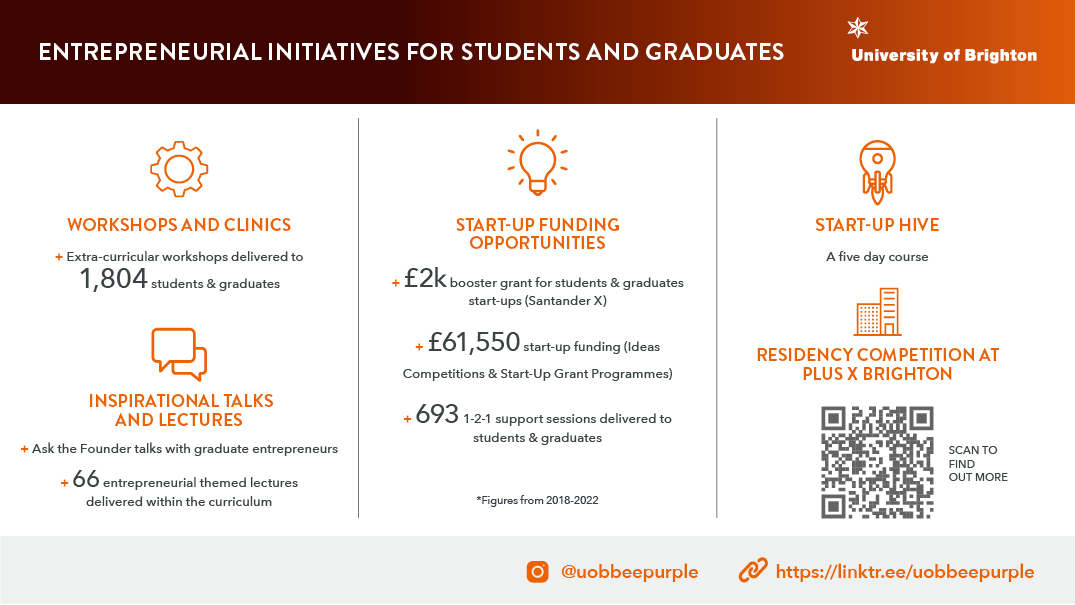
Addressing global challenges, innovating regional solutions
Thinking globally, acting locally is a fundamental approach for much of our collaborative research that supports local growth and regeneration. We work with regional partners to address global challenges that have a direct local impact on our communities. Examples include:
Health and wellbeing: UoB has a longstanding reputation for our work providing drinking water and water treatment innovations regionally and internationally. In the last three years, we have worked with Hanovia, Southern Water and South East Water to assess the quality of water sources and develop innovative water treatment methods for water recycling and desalinisation. Other examples include working with Coopervision, the south-east-based global leader in contact lenses, to improve the performance of contact lens materials and develop new technologies and novel in vitro models for the company.
Climate change: UoB has a history of engineering excellence and continues to innovate with new technologies to promote the global shift to sustainable energy. Our engineers work directly with several high-profile hydrogen technology companies, and the University is a core member of the Hydrogen Sussex network, supporting 63 public and private sector organisations developing the regional hydrogen economy. We also work with industrial partners from construction to maritime to support their use of green energy.
Creative, sustainable economies: The £5m ERDF BRITE project is run with Plus X as part of our continuing partnership instigated by our joint regeneration programme (detailed below). BRITE utilises university expertise to support SMEs to innovate their businesses. As part of this, UoB ran open innovation programmes such as Profitnet that have been developed by researchers and informed by SMEs to innovate, grow or help businesses to pivot. In addition, we have worked on seed-funding research projects to open up academic expertise to SMEs new to collaborating with universities.
Delivering innovative campus developments and hub facilities
As part of our £150m Big Build redevelopment programme, we have collaborated with property developer U+I to create a new home for the School of Business and Law and the Plus X Innovation Hub for start-ups, scale-ups and research- and innovation-led SMEs. The Hub, in collaboration with UoB, secured a further £5.5m ERDF funding to support space, workshops and academic-led research for SMEs to create new products and services.
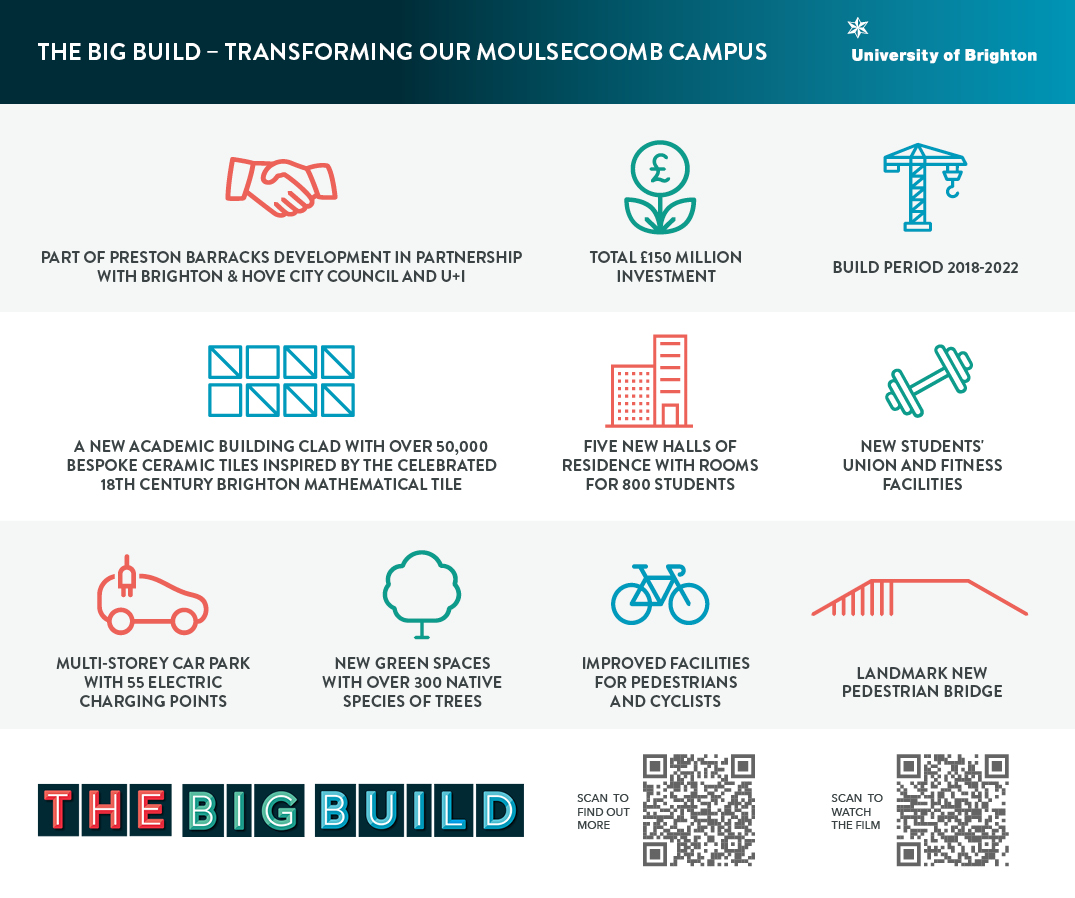
Our three Brighton campuses play a key role in delivering against our
regional priorities. Research and teaching at our Falmer campus focuses
on education, health and wellbeing, offering exciting new opportunities
to address health and education inequalities through multi-disciplinary
working with stakeholders and community groups.
Research and teaching at our Moulsecoomb campus focuses on addressing
climate change and promoting creative, sustainable economies. The
Advanced Engineering Centre is based here working with international
companies located in the region, such as JLC and Ricardo, to address
joint research and impact needs.
Our Cryogenics Hub is led by experts who explore the vast potential applications of cryogens in industries ranging from transportation to space, and biomedicine to energy storage. Our pioneering theoretical and applied research supports the product development of innovations including the split cycle engine, in partnership with Dolphin N2
The new £34m School of Business and Law provides a hub for SMEs sharing invaluable expertise through business support programmes such as Help to Grow Management Programme.
Our City campus is our creative industries centre, hosting nationally-acclaimed archives that are co-funded by key partners. The University of Brighton Design Archives is an accredited archive service, supported by Research England and a recipient of the Sir Misha Black Award for Innovation in Design Education, and the Screen Archive South East is a rich, historical resource, funded by £1.7m from the British Film Institute. In 2019, we launched the Brighton Centre for Contemporary Arts, welcoming over 12,000 visitors each year.
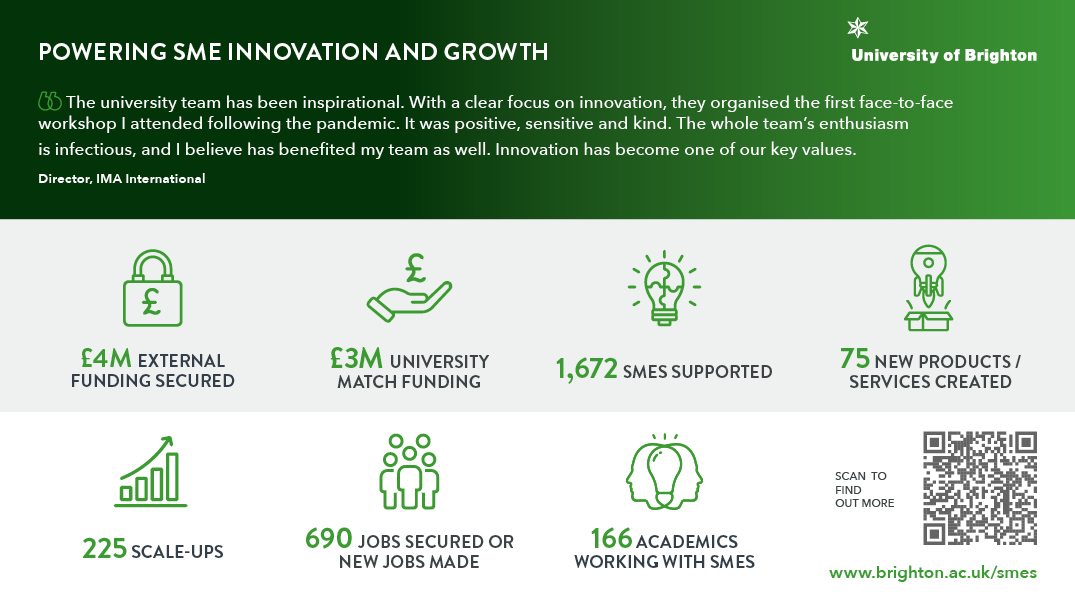
In the last three years, over 1,600 SMEs have participated in our innovation and skills programmes, such as Clean Growth UK, BRITE, RISE and Knowledge Transfer Partnerships (KTPs) to help them to:
explore ideas, by identifying barriers to growth, innovation challenges and opportunities for commercialisation
develop knowledge, through direct access to the latest research, specialist expertise, peer-to-peer networks, SME innovation hubs and student placements
build capacity, by enhancing innovation management capability, new skills and sector insights through workshops, masterclasses and seed-funding opportunities to collaborate
unlock expertise, by providing easy access to leading academics and facilities to work directly on innovative R&D projects and supporting SMEs to secure funding to support them through their knowledge exchange journey and KTPs.
UoB supports businesses to develop new products, services and processes as well as seeking to address underlying challenges. Over the last three years, we have delivered interventions to address tourism and the visitor economy that have been hit hard by COVID. We have continued to build on our outstanding reputation on net zero/low carbon SME initiatives through Clean Growth UK. Our health and wellbeing activity includes addressing adult social care, HIV/AIDS, performance sport, child health and mental wellbeing. Digital and creative industries have, for example, benefited from sharing of data secured via our partnership with Gatwick Airport. Our cross-sector interventions support innovation projects, supply chain management, decarbonisation, and peer-to-peer learning as well as small grant provision via ERDF funding.
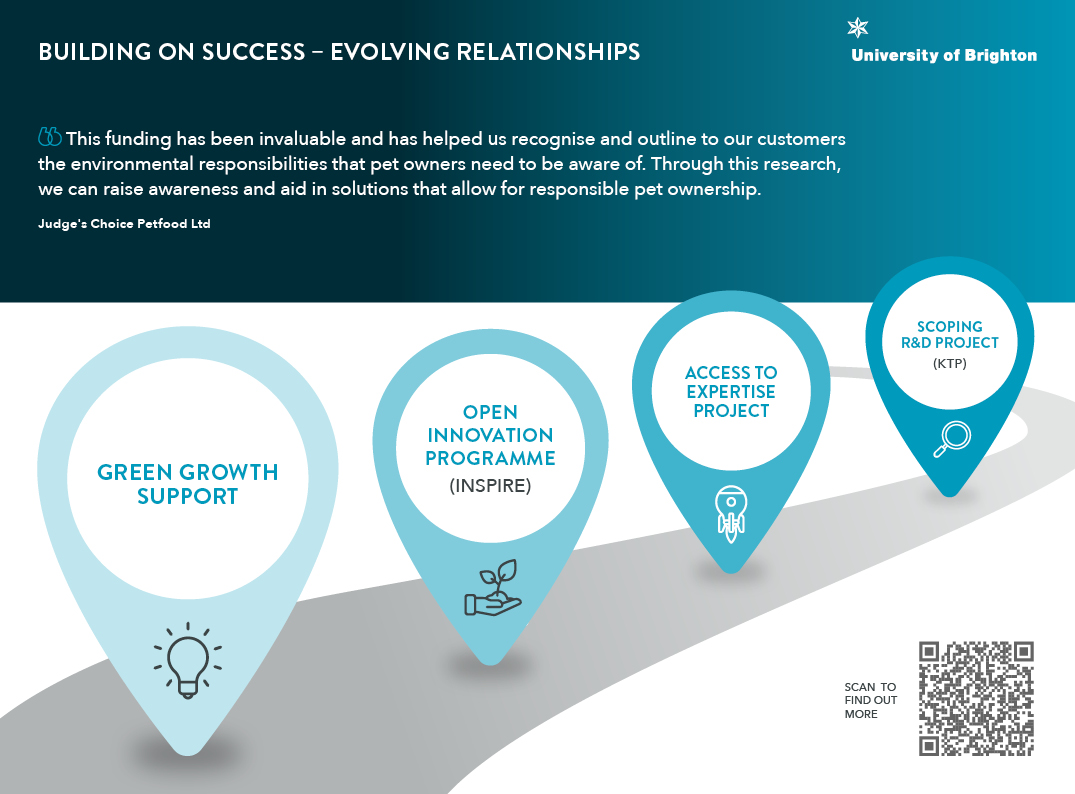
Aspect 3: Results
We improved the innovation ecosystem by:
We created a dynamic cluster of 1,338 SMEs new to innovation within the region. Approximately 80% of SMEs going through the innovation programmes had never worked with a university before.
We created 58 graduate posts employed to support specific innovation projects. Many of these employers had never employed a graduate before (STEP-UP).
166 academics from our academic schools collaborated with SMEs on their innovation journey. Wide-ranging subject expertise supported economic growth.
A growing network of 225 scale-up businesses were active members of our SME growth programmes. Kingsway Care participated in our Profitnet programme to develop a scaling strategy – this has increased their workforce by 14%. The company continues to work with UoB via student placements and is looking to innovate further.
The School of Business and Law secured the Small Business Charter accreditation as a result of the depth and scope of our SME innovation and growth-led practice. UoB innovation also supported start-ups and entrepreneurs to participate in wider business support programmes such as Help to Grow.
Our regionally-focused portfolio of Knowledge Transfer Partnerships continues to grow. We rank sixth within the greater south-east region for annual partnerships and have a 100% KTP funding success rate. Ranked as one of only four universities nationally featured in both high quality/high volume lists for 2020/21 KTP submissions, 90% of our KTPs completed in the last three years were graded as outstanding.
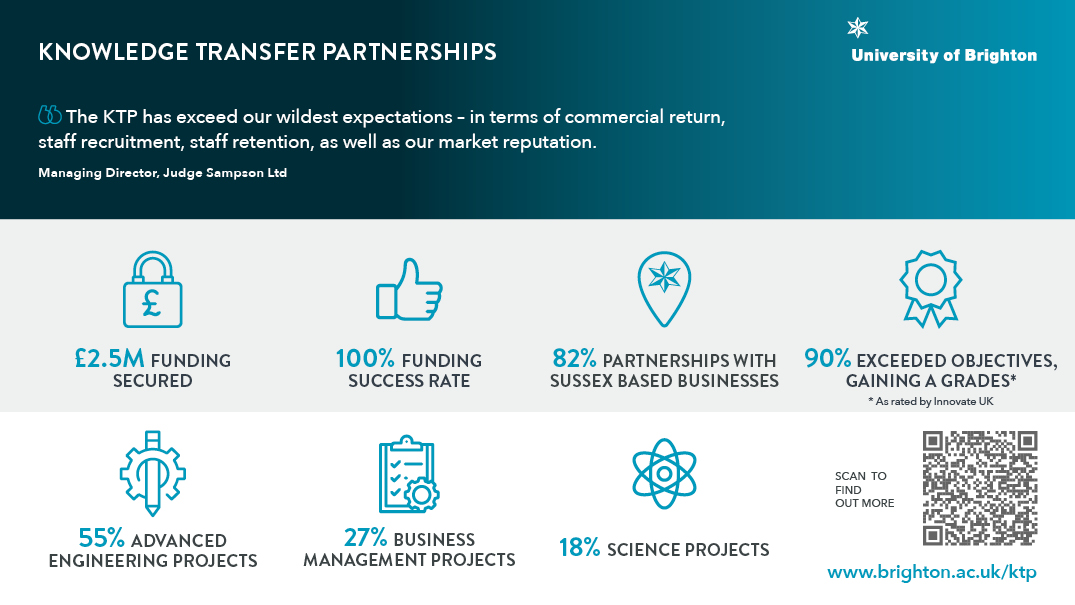
Our joint programme with the Plus X Innovation Hub has supported 116 companies. We develop sustained collaborations including MarinaTex, who create biodegradeable plastic alternatives from fish waste and are furthering their academic partnership with an Innovate UK grant and private investment as well as Judge’s Choice Petfood Ltd, who by working with a variety of UoB experts have secured 9 new trademarks.
Strategic engagement with West Sussex County Council and local authorities, secured £450k to stimulate innovation-led growth in three economically-challenging locations – coastal and rural West Sussex and Crawley – supporting 170 SMEs. We were the lead partner, in collaboration with the University of Sussex.
We have worked with over 300 SMEs on live briefs and student internship programmes. With a core cluster of our businesses located in Brighton & Hove, our gateway approach reaches businesses engaged throughout the region. Nearly a third of these SMEs engage in other SME activity with the University.
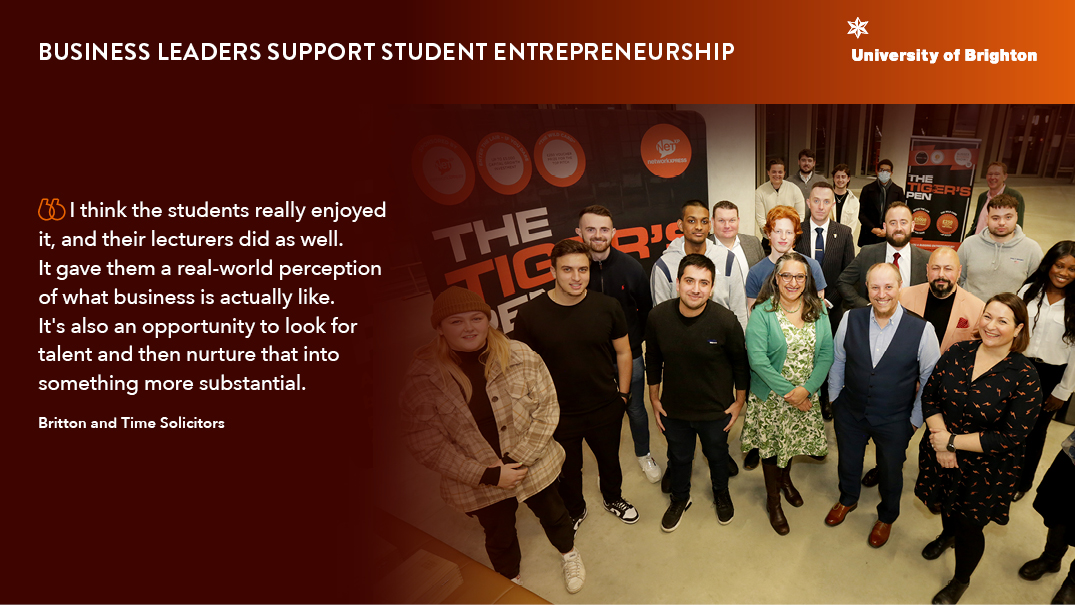
650 SMEs and freelancers from the digital and arts sector benefited from a joint project with Gatwick Airport that exploited performance data to support projects including the 3D visualisation of Gatwick capacity, immersive arts technology and early stage creative experimentation. Elements of this continue via the UoB Connected Places Catapult Fellowship.
Global challenges, regional solutions include strategic business partnerships such as the JLC Group and their sister company INDe EV Ltd, have established a partnership to develop and bring to market a new state-of-the-art, fully-electric, adaptable, modular van. The University's Advanced Engineering Centre works with INDe Ev preparing the van for production with the ambition of setting up manufacturing sites at various locations in the UK. These micro-factories are set to create a further 350 new jobs and produce over 11,000 vehicles per year. A dedicated EV lab sponsored by INDe EV Ltd is being developed with the aim of addressing the growing demand for innovation talent in the electrification and decarbonisation fields within engineering.
UoB’s Clean Growth UK South East hub has supported 492 businesses in the green transition via innovation, commercialisation, net zero and funding support. Businesses have also benefited from £500k of Low Carbon Across the South East (LoCASE) grants to boost their green growth and energy efficiency.
Public & Community Engagement
Summary of approach
A culture of engagement is in the University of Brighton’s DNA. Our distinctive approach to community-university partnership programmes is grounded in our values: inclusivity, partnership, creativity, sustainability. Our exploratory engagement practices are underpinned by a focus on co-production, social learning, and tackling disadvantage and inequalities. Our Public and Community Engagement (P&CE) Hub works alongside six engagement teams and teaching and research colleagues, to deliver a breadth and depth of activities that recognise the importance of mutual benefits for students, communities, and the University. These activities are mirrored in our dynamic, multi-layered institutional structures that, in turn, reflect our collective energies and a common purpose. Developed through review and reflection, our new P&CE ‘collaborate’ plan supports the delivery of our ambitions.
Aspect 1: Strategy
“The university has a distinctive culture of engagement where the value of engagement is recognised for both research and teaching; one which prioritises mutually beneficial two-way partnerships, addressing community needs and learning from partners.” Engagement consultant
1.1 Culture
A culture of engagement is in our DNA. Its roots are in our history as a university that offered education by and for the area's teachers, designers, public workers, engineers and health professionals. Our education and research have a real-world collaborative ethos with a commitment to addressing global challenges by making a tangible difference to lives and environments. In 2003, the University established the award-winning and pioneering Community University Partnership Programme (CUPP). Its distinct approach to co-produced Public and Community Engagement (P&CE), published in books, reports and peer-reviewed journals, has permeated the institutional culture. A 2022 P&CE university survey of colleagues found that just over half (85/152) undertook P&CE to learn from community partners. A national survey found 24% of researchers (580/2420) chose learning from public groups as a key benefit.
1.2 Distinctiveness
During 2021/22 we undertook research to develop a new institutional P&CE strategic plan including:
documentary review of 100+ sources
12 Higher Education Institution interviews
P&CE university survey (152 colleagues)
five focus groups: community organisations; students; researchers; professional services; partners, alumni and governors
Internal/external stakeholder meetings and 1-1s to test ideas.
This highlighted distinctive institutional approaches to P&CE, now embedded in the plan:
focus on social disadvantage and tackling inequalities
community-university partnership programmes, underpinned by experimentation and co-production
deep community knowledge partnerships with mutual benefits
innovative research methods and tools to co-create research
thinking globally and acting locally with community partners, to support social and sustainable development.
1.3 Structures
Figure 1 highlights our P&CE structures and institutional approach underpinned by our values: inclusivity, partnership, sustainability and creativity. These values are core to our institutional strategy Practical Wisdom and P&CE distinctiveness. A new P&CE Hub leads on the strategic plan supported by the Research and Knowledge Exchange (R&KE) department. Associate Deans are responsible for R&KE in schools, along with academic KE and Equality, Diversity and Inclusion (EDI) leads. Six professional service teams work with external partners to deliver innovative P&CE activities (Figures 3-4). The plurality of our P&CE activities is reflected in our governance structures. The institution works closely with a variety of stakeholders who identify community needs, monitor impacts and shape our work, eg community partner involvement in seed-funding selection panels. We are committed to the Concordat to Support the Career Development of Researchers; our implementation plan includes actions to review, increase and support KE and P&CE. A new governance pathway for the P&CE plan comes through the University’s Research and Knowledge Exchange (URAKE) committee, along with leadership from two Pro-Vice-Chancellors and the University Executive Board. Our established institutional commitment to EDI is recognised by kitemarks.
1.4 Ambitions
The cornerstone of the P&CE plan is underpinned by the following ambitions:
continue to enable and extend opportunities for mutually beneficial relationships between students, colleagues and community partners
champion collaborative ways of working, including co-creation and evaluation
address local and global challenges that speak to our values, with an emphasis on EDI and community collaborations
amplify and develop existing P&CE governance structures to offer further scope for dialogue and development
creation of a P&CE Hub, led by CUPP and supported by R&KE and communication colleagues
build the culture of P&CE practices into the support for research development, training and capacity building initiatives
capture and communicate the breadth of P&CE activities.
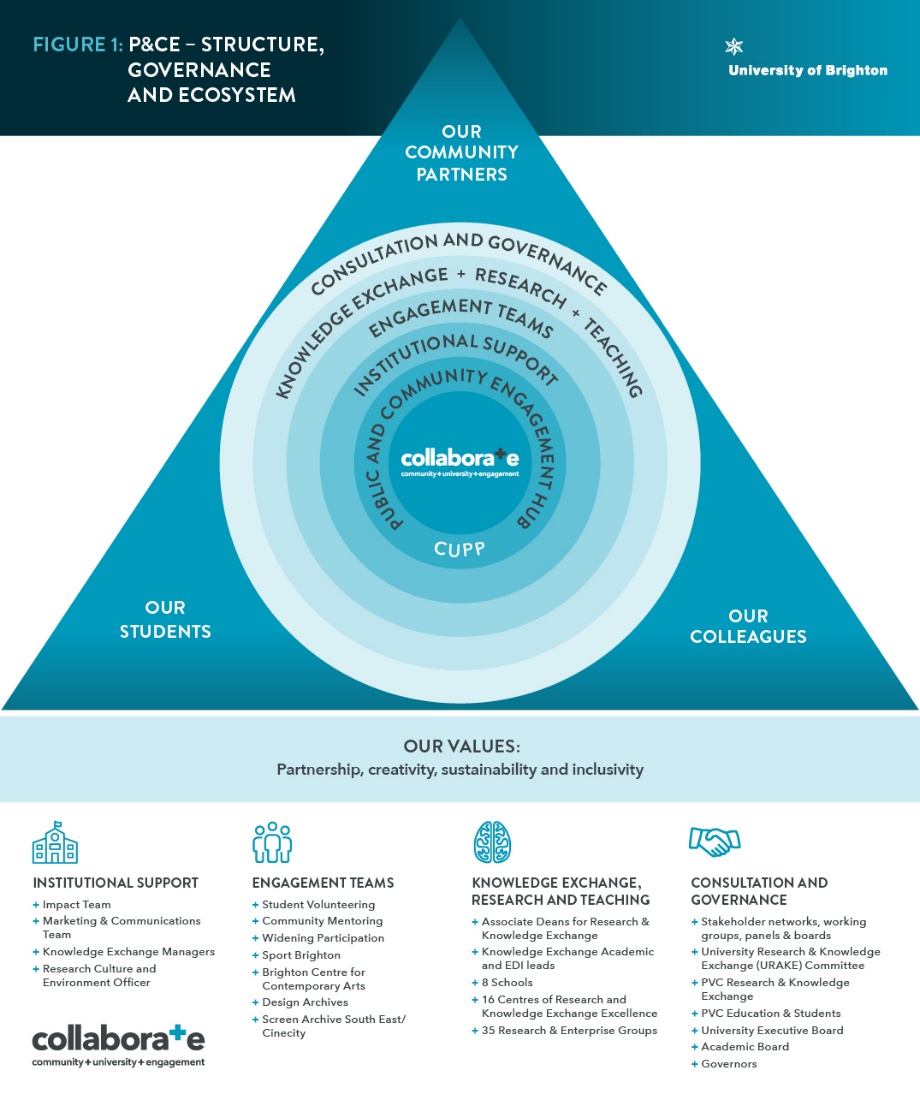
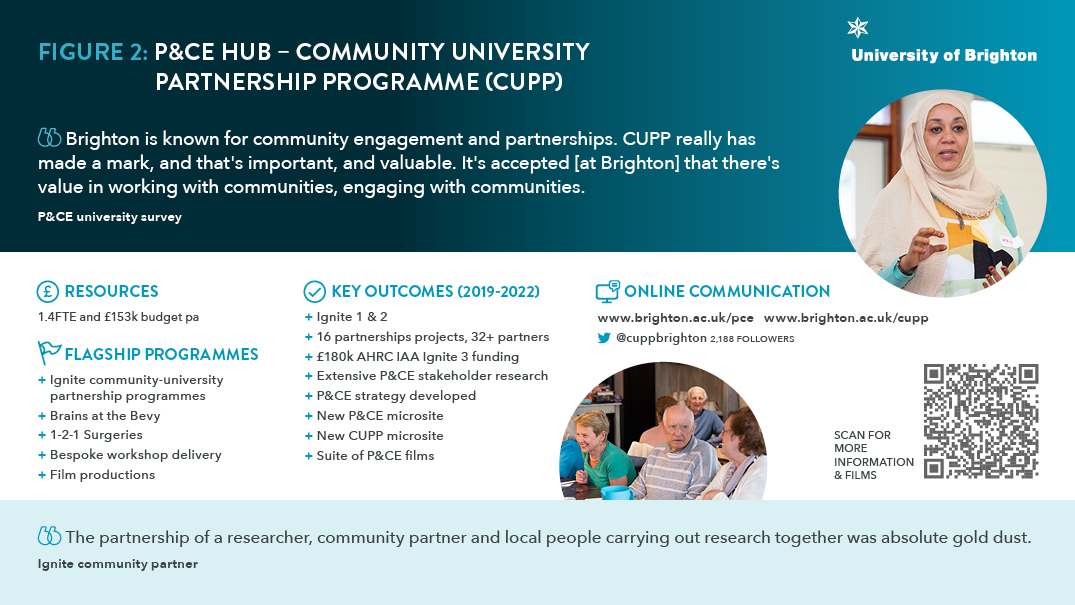
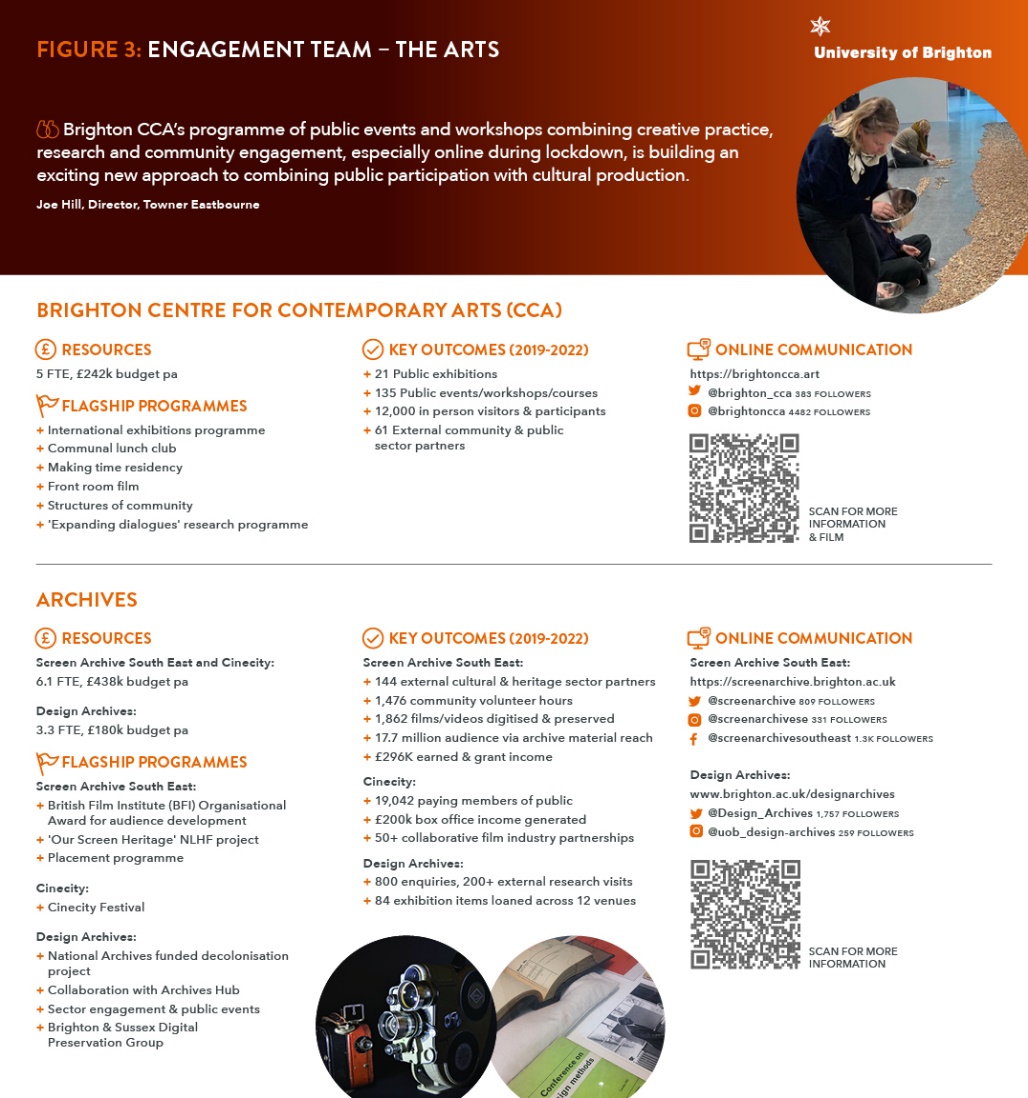
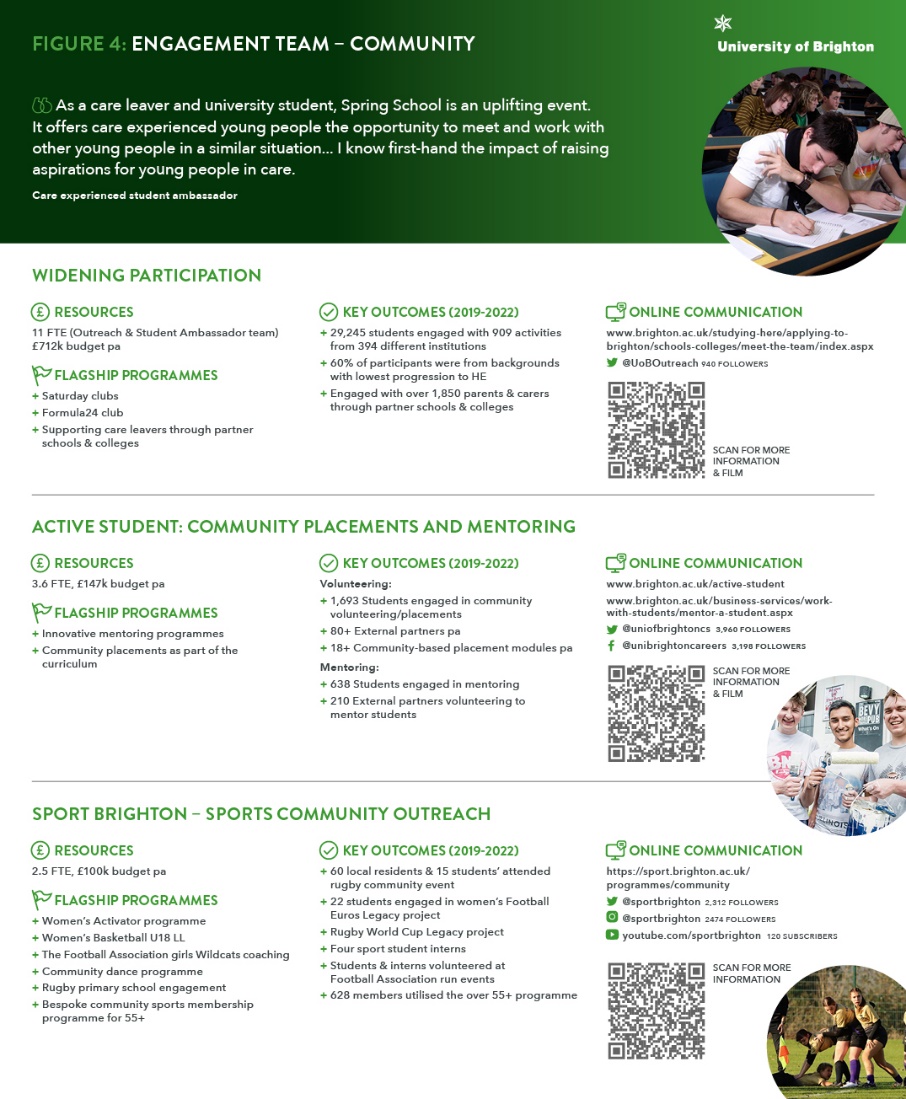
Aspect 2: Support
“I thought the [community placement] was so, so valuable. I learned so much from it. […] That's really translated to my job, I don't think I'd have the skill-set I do now …if I didn't have that volunteering experience...” Alumni focus group
2.1 Central programmes
The CUPP P&CE Hub, supported by R&KE, delivers a set of institutional initiatives (Figure 2). Ignite is our flagship cross-institutional programme that develops new, or extends existing, community-university partnership projects (Figure 9). The award-winning ‘Brains at the Bevy’ is a longstanding P&CE programme (Figure 5). Alongside CUPP, our six engagement teams also undertake diverse P&CE activities and their combined 2022 budget of £1.97m reflect internal and external sources, while excluding wider R&KE and School resources (Figures 2-4). Expenditure is focused on programmes/initiatives enabling long-term engagement, addressing partner-identified needs and networks to share learning (Figures 2-4).
2.2 Engaged research and learning
CUPP and our engagement teams also help deliver collaborative research and learning opportunities. Eg Brighton CCA is a site for experimentation with partners and audiences through events, publications, talks and screenings, showing the value of practical research, learning through making and creating a democratic space for culture. Our survey highlighted how important P&CE is to our research and teaching. The majority of respondents agreed that P&CE helped achieve research goals (69/101) and generate impact (70/97). Nearly three-quarters (70/99) felt P&CE helped deliver high-quality teaching, providing them with networks and collaborations beneficial for teaching (66/98). Nearly half reported they developed or delivered undergraduate teaching that included P&CE.
The breadth of engaged research (3.1) is also replicated within teaching (Figure 7). Student community engagement has a long history and takes place at considerable scale across the University. Community placement modules are established where research links directly to local community interest areas, eg marine pollution, urban ecology, sport media, fashion communication, hospice care, and primary school English and drama supported by the National Theatre. We continually evolve this work and respond to interest from community partners and students, eg increasing the number of ‘live’ briefs, such as co-developing a charity’s branding. During 2019/20, we developed a pilot research internship for 12 undergraduates, including a community focus, which has since been expanded. In 2020 the Inclusive Practice Partnerships (IPP) Scheme was established to co-create a more inclusive curriculum through decolonisation and diversification. Our longstanding partnership with the University of Brighton Academies Trust, through our School of Education enables sharing of ideas, expertise and good practice to support teachers and their 7700 primary and secondary school pupils.
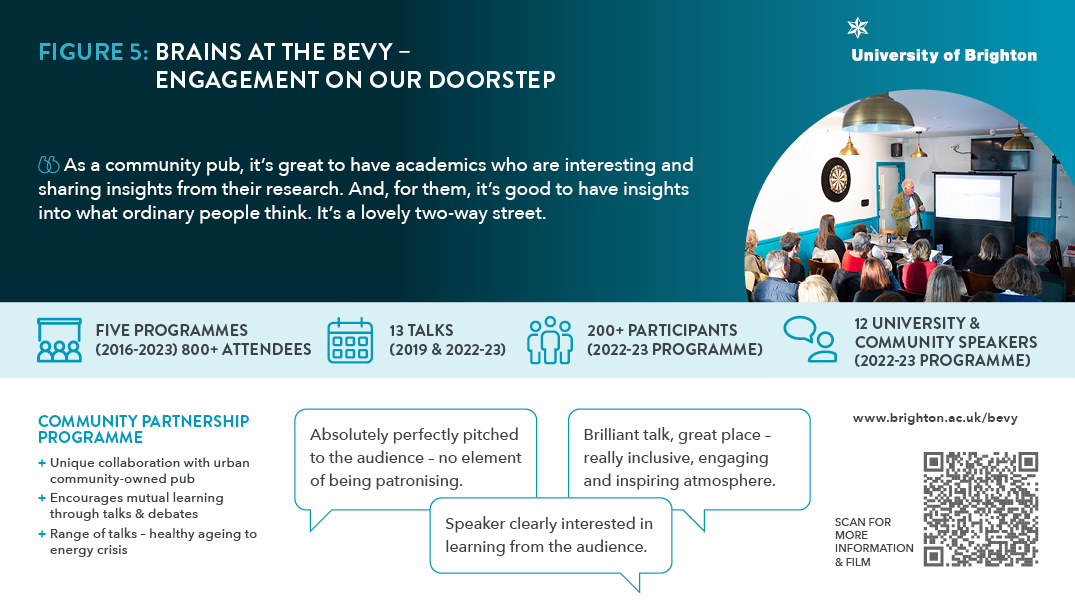
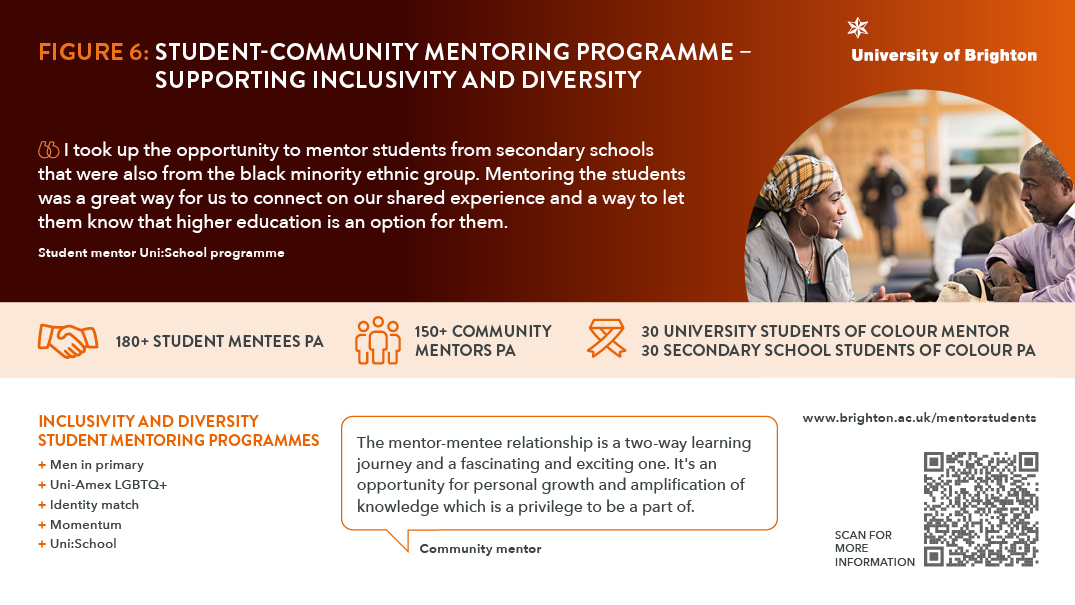
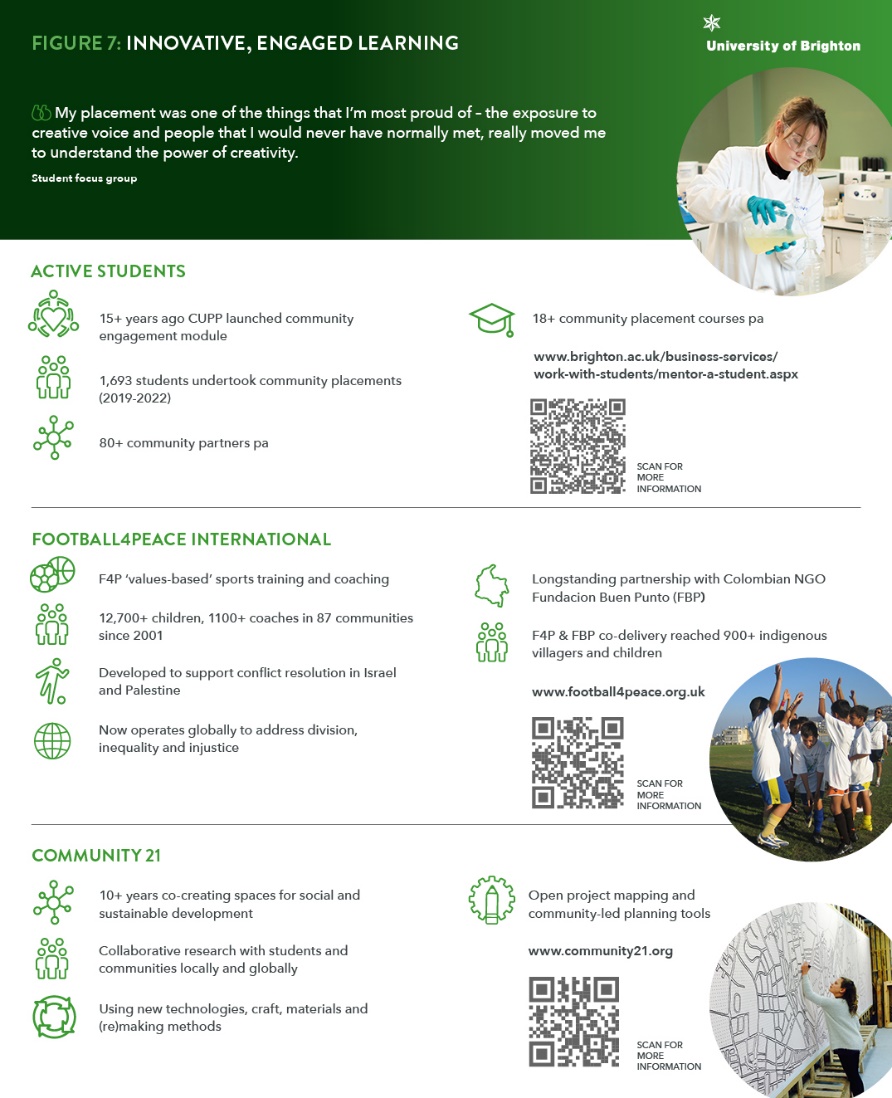
Aspect 3: Activity
“This partnership is key to delivering safe and effective healthcare into the future. It [also] ensures our students have access to the knowledge and skills of practitioners at the cutting edge of clinical practice.” P&CE university survey
3.1 P&CE breadth
Our values and focus on global challenges underpin the breadth of our P&CE activities. Our P&CE Hub and engagement teams deliver a range of distinctive programmes, using performance measures to monitor reach and effectiveness (Figures 2,3,4,5,6). The breadth of P&CE activities within our teaching (Figure 7) is also reflected in our research (Figure 8) that often includes a focus on young people. In collaboration with the Aquifer Partnership and the Living Coast Biosphere, colleagues will be working with schools to share learning from a UNESCO-backed programme to reduce groundwater pollution. Our Professor of Public Understanding of Science advises broadcasters on science education. Dr Lance Dann and colleagues have produced The Rez, a drama-based podcast and comic book story that engages young people with issues of mental health and ideas of kindness. The audio series has been downloaded over 300,000 times, has won top industry awards and is the first podcast to be accredited for use in UK schools.
3.2 P&CE depth
An internal audit of REF impact case studies highlighted that 60% had P&CE as a core component, and 65% delivered outcomes relating to marginalisation and inclusivity, as illustrated by two REF case studies with a long history of involvement with CUPP:
Boingboing is a social enterprise established in 2014 through a close partnership between the University and community partners. Its innovative Resilience Framework has been applied to an £11m, multi-partner, co-produced programme in Blackpool (2016-22), one of the UK’s most deprived towns. Led by Blackpool Council, it was one of five strategic investments by The Big Lottery Headstart and has delivered a range of social impacts, including training for over 70,000 public sector practitioners. A Manifesto for community development was published with commitment from 18 organisations.
Alice Fox’s research has made a shift towards enhanced social inclusivity through collaborations between artists with and without learning disabilities. Rocket Artists Studios, co-founded in 2004 with support from CUPP, still operates today. Fox’s research has helped turn the dial on the importance of inclusive arts practice, through working with organisations across Southeast Asia. In Vietnam (2019), Inclusive Arts training with 25 participants from 13 creative hubs, led to follow-on projects including workshops for 250 marginalised children to make instruments and learn to play music.
Since 2003, CUPP has pioneered programmes that support community partnerships. Brighton was one of twelve universities selected for the UKRI and NCCPE programme: Strategic Support to Expedite Embedding Public Engagement with Research. Over 2018/19 CUPP piloted Ignite 1 (Figure 9), a fast-track programme used as a platform for community-university partnerships and projects, underpinned by its rich evidence base on co-production. Outcomes for projects delivered over six months included: activities to support the mental health of children in a disadvantaged community; securing land to develop community housing; and exploring anti-racist pedagogies in museums. One innovative partnership on marine toxins has attracted £250k+ funding and featured on the BBC’s Countryfile and One Show.
Since the pilot, Ignite has been further developed:
Ignite 2 (2022) With a total £30k seed-funding budget, nine partnership projects over six months engaged with 350+ stakeholders across five countries (UK, Italy, Greece, South Africa and Egypt). The partnerships have escalated opportunities that continue post funding.
Ignite 3 (2022-2025) Funding secured for a three-year programme focused on Arts and Humanities impact (5.3).
Key to Ignite is creatively capturing learning. In collaboration with our partners, we have developed a suite of Ignite 1 films and an overarching Ignite 2 film.
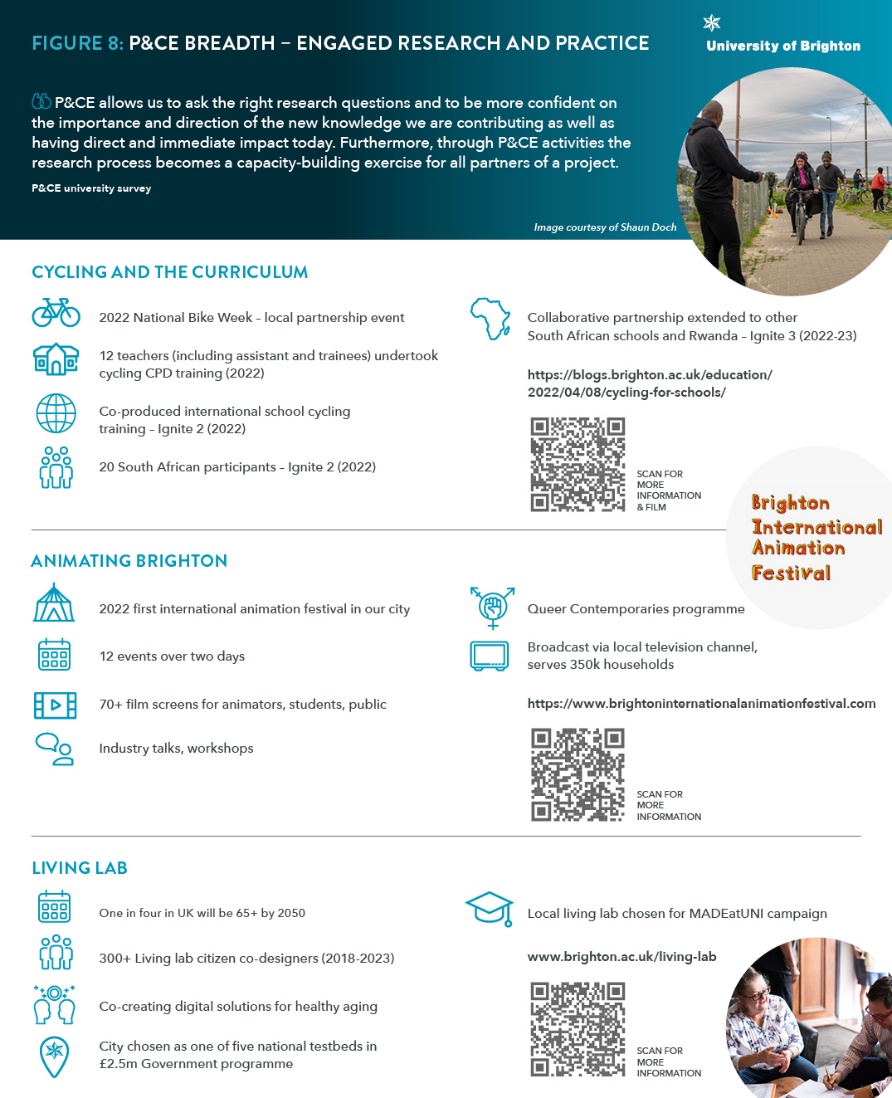
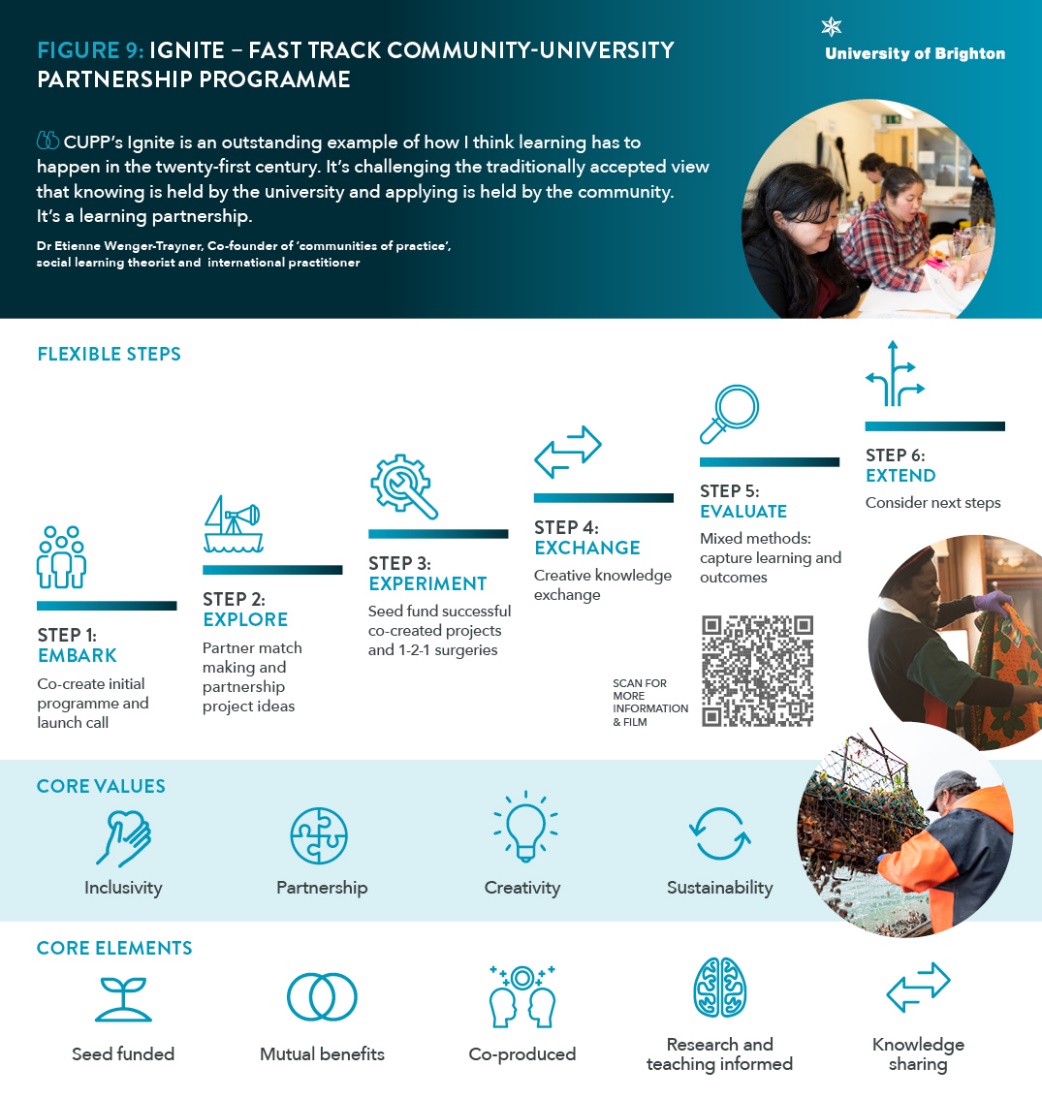
Aspect 4: Enhancing practice
“We've got an awful lot out of the university [...] it's been really, really valuable. Particularly the impact reports and the research […] has a great influence when we make funding bids. I'm constantly recommending people to get involved with the university.” Community partner focus group
Our approach to engagement and evaluation is multi-layered, recognising diverse voices and actors in the process. A dynamic approach to evaluation produces rich quantitative and qualitative data, drawing on the experience of research colleagues and partners to ensure intelligence based strategic implementation (Figure 10).
4.1 CUPP P&CE Hub
Our institutional approach involves teams adopting evaluation methods customised for activities and partner needs. One key principle, ‘defining in the doing’, creates an evidence base for forward-looking improvement (Figure 10). For example, the Ignite programme (Figure 9) was evaluated using social learning spaces; interviews; self-evaluation forms and novel film productions. CUPP programmes also utilise internal expertise eg internationally-renowned social learning theorist Dr Etienne Wenger-Trayner co-developed aspects of the Ignite pilot, along with Professor of Public Policy, Phil Haynes. Ignite partner, Dr Helen Johnson, works with CUPP drawing on her participatory arts methodology and Emeritus Professor Stuart Laing, co-founder of CUPP, remains actively involved and has developed an Ignite evaluation framework.
4.2 Research and teaching
Colleagues have built up research expertise into complex evaluation methodologies, including working with communities to co-design evaluation programmes eg the Audio Active ‘Room to Rant’ evaluation. Working with CUPP, Dr Mary Darking and Dr Carl Walker formed a five-year local community partnership: the Monitoring, Evaluation and Impact Partnership, and findings were included in the Brighton & Hove Fairness Commission Report. A Monitoring and Evaluation Framework (MEF) guides the evaluation of our Economic and Social Engagement activity across teaching/community-based teaching modules. The MEF is part of our university Evaluation Strategy, which focuses on: increasing the volume and dissemination of evaluation outcomes internally and externally and promoting collaborative evaluation. Project evaluation and funder reporting is routine practice across research, supported by monthly reporting on grants, involving Principal Investigators, School Deans and the Associate Director of R&KE.
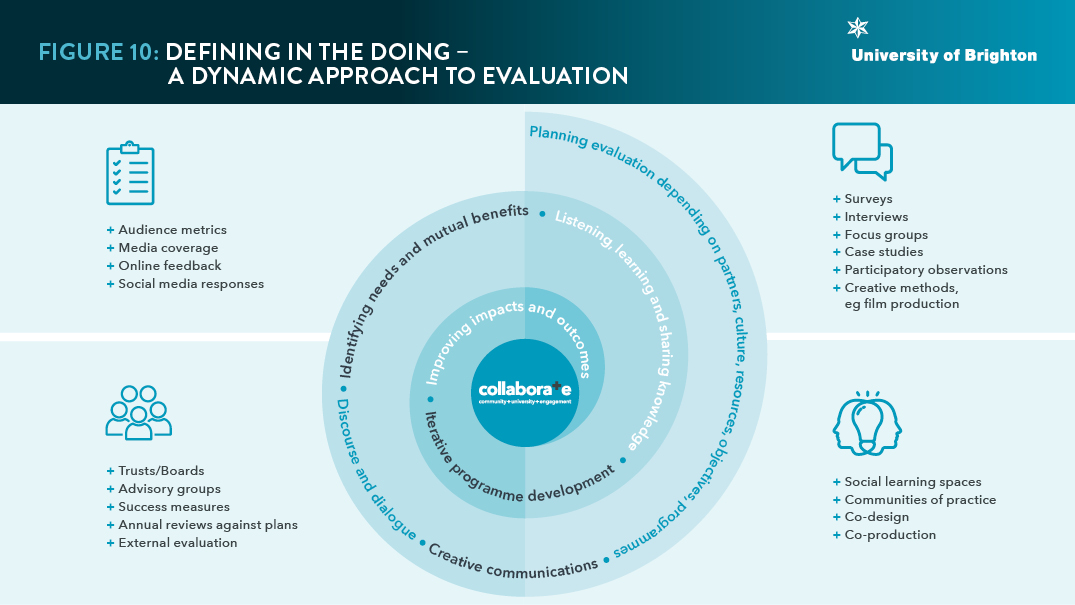
Aspect 5: Building on success
“Through careful collaboration it is possible to fully integrate multi-disciplinary research, cutting-edge teaching and partnership opportunities that generate tangible and lasting impact, build trust and form unique, memorable student experiences” P&CE university survey
5.1 Building on ambitions
Where key engagement programmes were affected by COVID, we focused on the research and development of the P&CE strategic plan, delivery mechanisms, internal networks and the establishment of an overarching engagement identity: ‘collaborate’ (Figure 1). In 2022, we launched new Brains at the Bevy and Ignite programmes. These activities built the foundations to achieve our P&CE ambitions (1.4), eg enabling and extending opportunities for meaningful engagement as evidenced by the snapshot of distinct and high-quality P&CE projects in Aspects 2-3. We shifted our approach towards a P&CE Hub, centred around CUPP and supported by invested professionals and academic leads (Figures 1-4). This has helped develop a critical mass around P&CE, which filters through all aspects of the learning environment.
5.2 Engagement culture
Aspect 4 highlights how teams evaluate and build learning at programme level. Our engagement teams and P&CE Hub produce internal reports with linked interim reporting to funders and stakeholders. Direct lines of reporting to senior leadership (Aspect 1) enable teams to monitor progress and utilise internal engagement routes to build capacity. The P&CE strategy development and survey (Aspect 1) helped sense check that the delivery mechanisms align with our strategic direction. It also led to improved capture and dialogue, supported through new informal mechanisms eg 1-2-1 engagement and impact surgeries. Following REF 2021, internal focus groups engaged research colleagues across disciplines and career stages to review support needs for research, KE and P&CE ambitions. Outcomes fed directly into the impact and P&CE annual monitoring process, formalised in 2021. These initiatives deliver on the ambition to capture the breadth of institutional P&CE activities.
5.3 Evolving practice
Brighton has gained considerable recognition for P&CE. This continues with invitations to share learning from the Ignite model with universities and sector-leading organisations including NCCPE’s Engage (2019/2020), Praxis Auril (2022) and Research Impact Canada (2022). While we have a rich P&CE legacy, we continually evolve our practice, being mindful of changing contexts and resourcing. Ignite was a key component of our successful bid for an AHRC Impact Acceleration Account (IAA). Peer reviewers highlighted the value of drawing on the successful pilot. Ignite 3 (2022-25) comprises 40% of the £450,000 grant offering opportunities for new iterations of the model, eg accelerating mature engagement projects alongside opening routes for innovative early-stage projects. Dr Lizzie Ward’s Wellcome Trust ‘Research Enrichment Public Engagement’ project with Fabrica art gallery (2018-20) commissioned an artist to use Virtual Reality to represent older people’s experience of care. It was disseminated via the touring Care(less) exhibition (2019/20), as reported in national media. Ignite 3 enables the partners to deepen engagement and evaluation of the project. While we continue to evolve our P&CE, at its heart remains the importance of mutual benefits for communities, students and universities:
“It is how we connect with our community in a meaningful way that encourages discussion and the sharing of knowledge and expertise. It is also about creating and developing worthwhile opportunities for our community and students by designing and implementing enterprising ventures. It is also about offering a transparent, credible and useful public service.” P&CE university survey
Note You are currently viewing the latest version of this narrative statement. View the previous version as published in previous iterations of the KEF (KEF1 and KEF2)